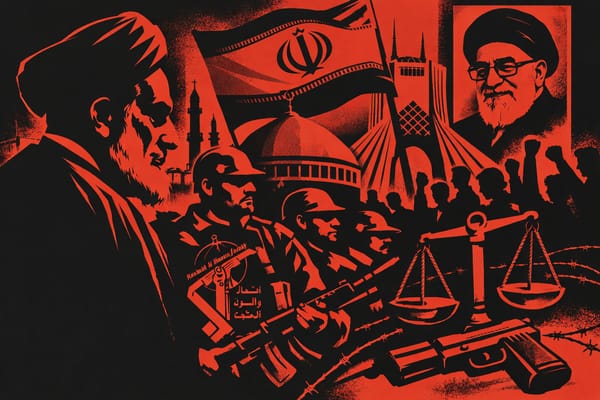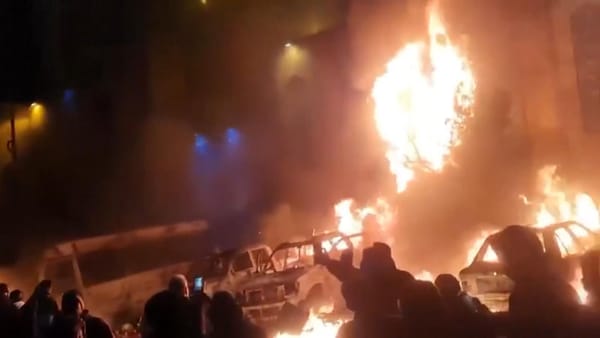The Prospect of Renewed Strikes by Israel and the United States, the Paralysis of State and Opposition, and the People’s Abandonment
The abandonment of the Iranian people cannot be laid solely at the feet of their rulers. The same indecision and short-termism that have long characterized the regime’s nuclear diplomacy appear, in another form, in the fractured ranks of the opposition.

September 8, 2025
Iran now stands at one of the most perilous moments in its modern history. Israel, long engaged in a strategy of threats and targeted assassinations against the Islamic Republic, has in recent weeks launched direct strikes. In twelve days of bombardment, it not only killed more than a thousand civilians but also eliminated nearly the entire senior security and military leadership of the regime.
The assault, carried out with the cooperation of the United States and tacit backing from Europe, has left Tehran openly bracing for a second wave. In a recent statement, Iran’s deputy foreign minister admitted that the likelihood of renewed Israeli strikes was “very high.” Even Supreme Leader Ayatollah Ali Khamenei warned of the perils of the current limbo, neither war nor peace, which he described as “dangerous” and ultimately dictated by the “enemy.”
For ordinary Iranians, the first wave of attacks underscored a devastating sense of vulnerability. Many reported that they had no place to go, no shelter from the missiles raining down on their cities. That helplessness remains. The regime itself is paralyzed: unwilling to negotiate, yet unable to defend against the military alliance arrayed against it.
Negotiation offers no guarantee, in the regime’s view, since Washington’s demands, chief among them the abandonment of Iran’s missile program, are regarded in Tehran as pretexts for continued deadlock. Meanwhile, Washington and Europe, having hardened their tone, show little appetite for renewed talks. The stalemate is absolute: a product of Tehran’s ruinous insistence on advancing its nuclear program, and of Washington’s apparent determination to reshape the Middle East, perhaps permanently. It is as if, critics say, the “dirty work” long deferred has now been entrusted to Donald Trump and Benjamin Netanyahu.
In response, the Islamic Republic has raised the “flag of blood,” invoking its grievances: the assassination of President Ebrahim Raisi and Foreign Minister Hossein Amir-Abdollahian in a helicopter crash widely suspected of sabotage, and the catastrophic explosion at the port of Rajaei. Loyalist commentators call for loosening domestic repression, at least in the short term, as a way of defusing widespread anger. Yet even such measures may amount to little more than a palliative, honey that sharpens the bile, or a scorpion stinging in the ring of fire.
The Opposition’s Hollow Role: Narrators of Suffering, Absent of Strategy
The abandonment of the Iranian people cannot be laid solely at the feet of their rulers. The same indecision and short-termism that have long characterized the regime’s nuclear diplomacy appear, in another form, in the fractured ranks of the opposition.
As the deadline approaches for the activation of the “snapback mechanism”, a process that could not only push Iran’s economy toward collapse but also make the country a legally sanctioned target for military attack, the government has failed to issue even a single statement of warning.
For a society exhausted by decades of crisis and sanctions, it should fall to the opposition to articulate a liberating vision. After all, the campaign of “maximum pressure” launched by the Trump administration in 2018 was always framed by the opposition forces in diaspora as a pathway to regime change. That it may culminate in war should surprise no one.
Yet the opposition has offered little beyond the tired refrain that “the Islamic Republic must go.” For eight years of suffocating sanctions, its role has been less that of a political force than of a witness, or, more accurately, a funeral reciter, of popular suffering, often echoing a Western-friendly narrative rather than defending Iranian society against imperial coercion.
In this sense, it is hardly unfair to suggest that the flood of poverty and despair engulfing Iran has been treated by much of the opposition as little more than a wave to ride, or, at best, to stand aside from, until the shoreline of regime overthrow comes into view.
What has been missing is the effort to reconstruct social agency: to offer concrete proposals and emancipatory strategies that might transform the opposition from a passive custodian of crisis into an active force for change. Without such a vision, both rulers and their opponents leave the Iranian people stranded, caught between war from without and paralysis from within.




